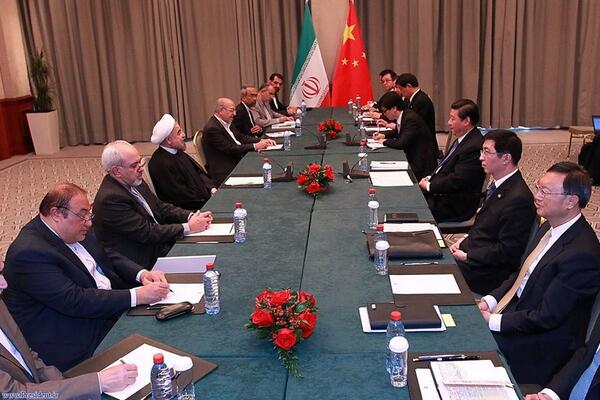The $400 billion Iran-China deal announced the other day opens up the Islamic Republic’s banking, telecommunications, ports, and railways to Chinese investment. In return, Iran will supply China with oil at discounted rates over a period of 25 years.
But the ‘icing’ may be in the fine print. With so much Chinese money flowing into key sectors of Iran’s economy, the question is whether control of ports and railways could see Beijing militarizing its assets.
Speculation is growing that China is getting unhindered access to the island of Kish near the mouth of the Straits of Hormuz. Iran has denied any such plan but the New York Times claimed in a report that China would build a new port at Jask, just outside the Straits of Hormuz. The paper reported that Jask “would give the Chinese a strategic vantage point on the waters through which much of the world’s oil transits. The passage is of critical strategic importance to the US, whose navy’s 5th fleet is headquartered in Bahrain.”
Washington shot off a warning. “The United States will continue to impose costs on Chinese companies that aid Iran, the world’s largest state sponsor of terrorism,” a State Department spokeswoman wrote in response to questions about the draft agreement.
But there’s more. The online energy portal OilPrice.com claimed that China’s investment in Iran’s core infrastructure was intended to align it with One Belt One Road. The portal said that new high speed rail lines and upgradation of existing ones will ensure seamless movement of passengers and goods to Kazakhstan, Kyrgyzstan, Uzbekistan, Turkmenistan and from there to Turkey and Europe. Much of this movement will be managed by Chinese companies transporting Chinese goods made in Iran.
The security dimensions also appear to be wide ranging with the Revolutionary Guard a key partner. OilPrice.com notes that “this will involve complete aerial and naval cooperation between Iran and China with Russia also taking a key role …. As of November 9, Sino-Russian bombers, fighters and transport planes will have unrestricted access to Iranian air bases.”
The truth in this claim will be known only later but it’s interesting to note that in August 2016, Russia is known to have carried out air strikes on targets in Syria from the Hamadan air base in western Iran.
A word on Iran’s decision to build the Chahbahar to Zahedan railway line on its own, foregoing Indian assistance. The line is over 600 km long and will cross into Afghanistan, reaching the border town of Zaranj, as such it was a strategic venture for India. But the US decision to tear up the Iran nuclear deal and enforce sanctions has hit India also, forcing it to dilute ties with Tehran.
Iran said it would finance the line from its national development fund although there are reports it would seek the supply of rail lines from India. Whether South Block will find that possible is not clear. But the fact remains, India has suffered another setback to its relations with Iran.





